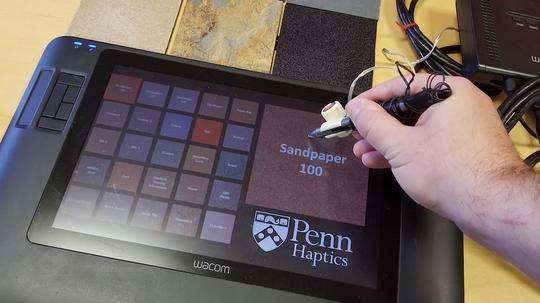
Have you ever felt physical discomfort when someone dragged their fingernails against a chalkboard? I belong in that camp, but I didn't realize that software combined with a regular drawing tablet could create the same effect.
Imagine dragging a stylus against a tablet and feeling like you were instead dragging that stylus against sandpaper or other kinds of surfaces that weren't really there.
This is a real thing, and it's made possible by software developed by a Waltham-based startup called Tactai, which is designed to create the sensation of touch and force feedback in virtual spaces, namely virtual reality and augmented reality, and on mobile devices.
"Our technology is mimicking those exact same vibrations that the mechanical receptors expect before they travel to the brain. That's why we can render it so accurately."
In a demonstration for BostInno, Tactai provided me with a large Wacom tablet and a stylus that was equipped with a small device near the tip of the stylus called a voice coil actuator. The Wacom tablet displayed different swatches of textures — microfiber cloth, sandpaper and felt to name a few. Next to the tablet were actual swatches as a way to compare the sensation of physical textures with digital ones.
As I brushed the stylus against the tablet when I selected the sandpaper option, the voice coil sent a fast and complex series of vibrations through my fingers that mimicked the sensation of rubbing a pen against real sandpaper. A couple of the digital textures, like towel, didn't feel as impressive, but then I got to frosted acrylic.
"It makes me feel uncomfortable," I said, as the simulated friction prompted a physiological response — similar to the feeling you get when you drag chalk down a chalkboard. To me, this was a clear sign that the company is onto something.
Tactai's haptic software is based on research by Dr. Katherine J. Kuchenbecker at Stanford University and the University of Pennsylvania. Using that research Kuchenbecker founded Tactai with Steven D. Domenikos, the company's CEO who previously held top leadership roles at technology incubator IERION, IdentityTruth and TeleGea.
The company can reproduce the way an object feels by dragging a special kind of stylus against it that can record the object's haptic attributes. The reason it works, Domenikos said in an interview, is that there are cells in our fingers called mechanical receptors that translate interactions with stimuli into vibrations, which Tactai's tech can recreate.
"Our technology is mimicking those exact same vibrations that the mechanical receptors expect before they travel to the brain. That's why we can render it so accurately," he said.
While the tech is intriguing, it's still early for Tactai, which is in talks with multiple companies for a variety of use cases. Domenikos said the company is working with a building materials supplier that could use Tactai's tablet application to showcase hundreds of materials when the company has limited shelf space at a brick-and-mortar store.
One of Tactai's most intriguing use cases is with virtual reality. Since the tech is software-based, the company can integrate it within any number of devices. For VR, the company has developed a small device that fits over your finger and provides haptic feedback and pressure when you reach out to objects and interact with them in the virtual world. This can be helpful when it comes to VR training simulators that teach workers how to handle equipment (Domenikos said Tactai is currently in talks with a company for this specific application). At the beginning of this year, Tactai partnered with Ericsson to show off a proof-of-concept demo at the Consumer Electronics Show.
The company is also working with manufacturers on a tablet computer that can mimic the feeling of writing on paper, Domenikos said. Newer smartphones like the Samsung Galaxy S8 can also take advantage of Tactai's tech without the need for a stylus, he added, which can open up many opportunities, including in ecommerce.
Domenikos said he can also imagine Tactai using its tech for cars, which are increasingly adopting flat displays for the user interface. With haptic feedback, these displays can become easier to use and lead to fewer drivers getting distracted by looking at the screen.
"The whole proposition is how to deliver this very rich sensation with just plain software. That's really our differentiation," Domenikos said.








